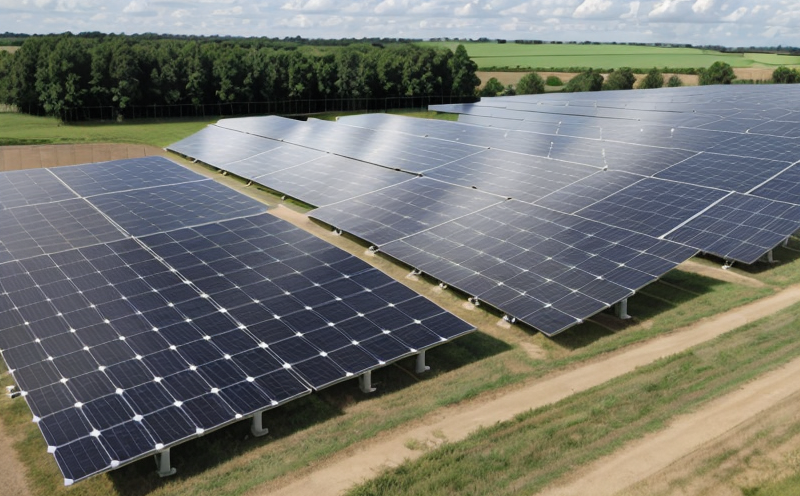IEC 61400 30 Floating Wind Turbine Performance Testing Validation Method Development Test
The IEC 61400-30 standard provides a comprehensive framework for validating the performance of floating wind turbines, ensuring they meet stringent safety and operational requirements. This service focuses on the detailed testing and validation methods defined in this international standard to ensure compliance with industry best practices.
Floating offshore wind turbines represent a significant advancement in renewable energy technology, allowing for greater deployment potential and more efficient power generation from deeper waters. However, the unique challenges associated with floating platforms necessitate specialized testing protocols that go beyond traditional onshore turbine validation methods.
Our team of experts specializes in the rigorous application of IEC 61400-30 to develop robust performance tests for floating wind turbines. This includes comprehensive analysis and validation of critical components such as structural integrity, mooring systems, dynamic behavior under various environmental conditions, and power output optimization.
The testing process involves several key steps: initial design review, field deployment simulation, real-time monitoring during operation, and post-deployment performance assessment. Throughout this cycle, our laboratory ensures strict adherence to the standards outlined in IEC 61400-30, providing accurate and reliable validation results.
For instance, structural integrity testing involves subjecting turbine components to simulated environmental stresses to assess their durability under extreme conditions. Similarly, mooring system performance is evaluated by simulating various sea states and wind conditions to ensure safe operation in challenging marine environments.
The dynamic behavior of floating turbines is another critical area of focus, where our laboratory uses advanced instrumentation to measure structural response during operations. This data helps in optimizing the design for efficiency and safety.
Power output optimization testing ensures that the turbine can generate maximum energy under all operating conditions. Our team employs sophisticated modeling techniques combined with real-world performance data to refine these parameters continuously.
The importance of this service cannot be overstated, especially as floating wind technology matures and expands globally. Compliance with IEC 61400-30 is not only a regulatory requirement but also a key factor in enhancing the reliability and safety of offshore wind farms.
Our commitment to excellence ensures that every aspect of our testing aligns perfectly with international standards, providing clients with confidence in their compliance efforts. By leveraging cutting-edge technology and experienced personnel, we deliver comprehensive validation services tailored specifically for floating wind turbines.
Industry Applications
The application of IEC 61400-30 is particularly relevant to the renewable energy sector, where floating offshore wind technology plays a crucial role in expanding clean energy resources. This service supports various stakeholders involved in the design, manufacturing, and deployment phases of floating wind turbines.
- Manufacturers: Ensure that their products meet stringent performance requirements as per international standards.
- R&D Engineers: Validate new designs and innovative technologies to enhance efficiency and reliability.
- Quality Managers: Monitor production processes to maintain consistent product quality.
- Compliance Officers: Stay ahead of regulatory changes and ensure ongoing adherence to standards.
The testing procedures outlined in IEC 61400-30 are essential for these professionals, as they provide a standardized approach to assessing the performance and safety of floating wind turbines. This ensures that all stakeholders can rely on consistent and reliable data throughout the lifecycle of their projects.
International Acceptance and Recognition
The IEC 61400-30 standard is widely recognized across the global renewable energy industry, including the United States, Europe, Asia, and other regions. Its acceptance ensures that testing results are universally applicable and accepted by regulatory bodies.
By adhering to this standard, manufacturers can streamline their compliance processes, reducing costs associated with multiple certifications in different countries. This also enhances market access for companies operating internationally.
The international recognition of IEC 61400-30 further solidifies the importance of our testing services. It provides a trusted framework that reassures investors and stakeholders about the reliability and safety of floating wind turbines. This trust is critical in fostering confidence among all parties involved in the renewable energy sector.
Environmental and Sustainability Contributions
- Reduced Carbon Footprint: Floating wind turbines contribute significantly to reducing carbon emissions by generating large amounts of clean electricity from otherwise inaccessible locations.
- Biodiversity Protection: Properly designed installations can minimize impacts on marine ecosystems, promoting healthier aquatic habitats.
- Resource Efficiency: Efficient power generation supports sustainable resource use and reduces dependency on non-renewable energy sources.
- Economic Growth: The deployment of floating wind farms stimulates local economies through job creation and increased investment opportunities.
Our testing services play a vital role in supporting these environmental and sustainability goals by ensuring that every aspect of the turbine's design, manufacture, and operation meets the highest safety and performance standards. This commitment to excellence helps drive the transition towards a more sustainable future.





